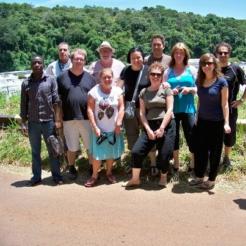A group of sceptical businessmen and women undertook the trip of a lifetime to Uganda. David Philpott explains why their perceptions are now changed forever.
Saturday was the hardest day. Not the six-hour drive from Kampala to Lira you understand - that was manageable, especially with a short break overlooking the raging rapids of the Nile while a soldier took our group photo. Once we had reciprocated and taken his – standing proud with a Kalashnikov at his side – the group had set off in good humour for the final leg of the gruelling drive. Only I knew what lay further ahead that day and also that nothing would prepare my fellow travellers for the assault on the senses they were going to experience before nightfall.
Hours later whilst we reposed at the home of the Opiokello’s as darkness fell, everyone tried to make sense of what had happened; the joy, the tears and the inner turmoil that such an experience had confronted them all with. It was as if they had caught a Saturday Night Fever. Two hours in the village of Achede had changed their lives forever and everyone knew it. The slums of Kampala the day before; the clinging children begging them not to leave; the orphans importuning that they might be sponsored as a child, not even the little boy called Innocence with his awful umbilical hernia, had prepared them for the reality of Northern Uganda on this afternoon just a couple of hours after being tourists on a bridge over the Nile.
There were eleven of us in all, but unlike the Judas-less disciples on resurrection morning, only three or four of our merry band possessed a faith. All were business leaders in their own right and all had come here to see how they might do good in an area where Joseph Kony and the infamous Lord’s Resistance Army had slaughtered tens of thousands here in Lira in recent years. Some of the group had been a little sceptical – a little uneasy even – because the trip had been organised by a Christian charity. I had succeeded in assuring them all that Fields of Life was different though and there would be no sermons or prayer meetings on the tour bus.
None expected the greeting as we wended our way across fields and found Achede – a village whose name in the local language means ‘to tiptoe’. As we approached, a score of women waving branches, wailed and kind-of-sang whilst parting like the red sea as the pick-up truck that had carried us from the main highway created a human chevron through the human tide. Arriving in the heart of this community of 221 families, we watched the Fields of Life water engineers digging the borehole with their tried and trusted equipment as Peter Walukamba explained to us how this simple technology would bring clean drinking water to as many has 2,000 people.
Then the village elders told us stories of internment camps and how they all still feared that the bad men might return again and steal their land, rape their women and make soldiers of ten-year-old boys against their will. We had some clothes to give out but not enough. Young boys stood in rags so tattered that I would not use them to wipe engine oil from a dipstick. When one of the African ladies invited us into her mud hut, a wave of emotion overcame not a few in our group; not just tears like you get in a movie when your heartstrings are pulled, but convulsive sobs. “How can this be?” everyone seemed to be asking. The house was spotless; the earth floor swept clean of dust, the lady as proud of her home as Hyacinth Bucket but without the airs and graces.
Everyone has returned home now. Some had business meetings within hours of the plane touching down at Heathrow. All had caught a virus for which there was no cure. These ten people will now fund schools or kindergartens, pay for wells or sponsor children. And because of them, not a few children in Achede will be Staying Alive.








